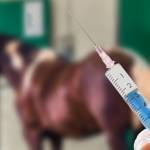Overdue Tetanus Vaccines in Horses: Catch Up on Protection

Time flies, even for the most organized horse owner. In the blink of an eye, one year—or even two—can pass without ever thinking about routine preventive care, including an annual tetanus vaccine.
According to the American Association of Equine Practitioners (AAEP), adult horses should be vaccinated annually against tetanus. If they’ve missed a year, then they should be vaccinated with two doses administered 4-6 weeks apart.*
“Tetanus is an important neurologic disease of horses, caused by the tetanus toxoid produced Clostridium tetani, spore-forming bacteria found in soil that contaminates wounds,” explained Kathleen Crandell, Ph.D., of Kentucky Equine Research.
Signs of tetanus include muscle stiffness and spasm, extreme sensitivity to touch, difficulty eating, prolapsed third eyelids, and a classic “sawhorse” stance. Sweating is common, as is increased heart rate, rapid breathing, and recumbency progressing to respiratory failure.
Vaccinating horses plays an integral role in disease prevention. Mortality rates of unvaccinated horses exceed 75%.
In some countries, horses are only revaccinated or “boostered” for tetanus every two, three, or even five years rather than annually as recommended in the United States. With this in mind, a group of Japanese researchers conducted a study to determine whether adult horses more than two years overdue on their tetanus vaccine should have one or two boosters.**
Blood samples were collected from 73 adult horses last vaccinated for tetanus at least two years previously. All horses were given a booster vaccine (either the tetanus alone in a monovalent vaccine or in a multivalent vaccine with influenza and encephalomyelitis). Half of those horses received a second booster four weeks later. Antibody titers for tetanus were measured at baseline (immediately prior to the first booster) and again 1, 2, 4, 8, 26, and 52 weeks later.
At the start of the study, the median antibody titer was 0.69 UI/mL. This exceeded the antibody required for protection against tetanus of 0.01 IU/mL or greater.
“This result indicates that the protective effects of the antibodies produced by the vaccine can persist for at least two years, which has been demonstrated in previous studies,” Crandell said.
This study also found that the antibody titers one year after booster with the monovalent vaccine were higher than in horses vaccinated with the multivalent vaccine. However, all antibody titers exceeded the effective titer of 0.01 IU/mL.
“In sum, this study found that the two-dose revaccination after a prolonged period (2-2.5 years in this study) did not provide any significant benefit over a single-dose revaccination. And the monovalent vaccine did not offer significant improvement over the multivalent vaccine,” Crandell said.
Until further research is conducted in horses using the vaccines available in the U.S., all horse owners are encouraged to continue following the vaccine guidelines laid out by the AAEP.
“For maximal response to vaccination, consider supplementing with natural vitamin E, known also as d-alpha tocopherol. In one study of mature horses with age-related decline in immune function, supplementing with vitamin E enhanced the cell-mediated immune response orchestrated by T cell lymphocytes, a vital component of the body’s immune response,” shared Crandell.***
Nano-E, a natural-source, water-soluble vitamin E supplement, features advanced nanotechnology for rapid absorption and availability.
*American Association of Equine Practitioners. Tetanus. Accessed June 1, 2023.
**Kinoshita, Y., T. Yamanaka, K. Kodaira, H. Niwa, E. Uchida-Fujii, and T. Ueno. 2023. Assessment of tetanus revaccination regimens in horses not vaccinated in the previous year. Journal of Veterinary Medical Sciences. doi:10.1292/jvms.23-0158.
***Petersson, H.K., D.B. Burr, M. Gomez-Chiarri, et al. 2010. The influence of vitamin E on immune function and response to vaccination in older horses. Journal of Animal Science 88(9):2950-8.








